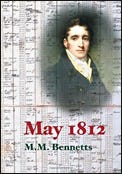May 1812 is a novel for Jane Austen fans. An intelligent romance set amid English fears of an invasion by Napoleon, it throws obstacle after obstacle in the paths of its hero and heroine as they traverse the rocky course toward true love. Longer than an Austen novel (perhaps overlong), it alludes to sex in a way Austen probably would not, though without explicit sex scenes, and features a heroine so beautiful and virtuous some of Austen's characters would have wanted to poke her with a hat pin. But the wit, psychological and sociological insight, and Regency flair of Austen are here in ample measure.
The Earl of Myddelton is a translator and code specialist in England's Foreign Office who enjoys horse-racing and, more ambivalently, the attentions of women in his rare free time. Marriage is the last thing he has the time or inclination for when he belatedly learns that he must, before her eighteenth birthday, marry a young woman chosen by his late father or lose his inherited fortune. Jane Heron is not the "brass-faced chit of a bloody social-climbing Nabob" Myddleton first assumes she must be. Gracious and accomplished, she has been raised by an uncle to the exacting standards that will fit her to preside over an aristocratic household. Alas, misunderstandings, gossip-mongers, Myddelton's hasty temper, and the demands of government service (including a risky mission into France after the Prime Minister's assassination) conspire to keep husband and wife from realizing how near their hearts are to beating as one.
Laced with archaic slang and lines of English, French and German poetry in their original languages (with translations), May 1812 will present hurdles for some readers, but will be all the more delicious for those who enjoy a period writing style. The servants' unmitigated adoration for their new mistress may require some suspension of disbelief; otherwise, the characters are drawn with psychological depth and insight. (2009; 581 pages)





Sounds like great fun to this Austen devotee!
I've read several Austen pastiches, and have rarely found them satisfying. May 1812 is one of those rare ones that held delight.